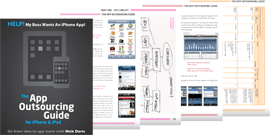Now there is one often forgotten point you should be clear on at this stage:
‘When does this app need to be ready by?’
or
‘Do I need an app out there now at any cost or quality?’
This is important, as a very common scenario I see is:
‘We just need an app so badly now we’ll put anything out and fix it later if we have to’.
If you’ve downloaded more than half a dozen apps, I’m sure you’ve seen countless ones where you download the app for ‘X Newspaper’ for example, install it and load it for the first time and your reaction is ‘so what, didn’t I already see this on Safari*?’. No extra features, no ‘wow’ factor, in fact I have seen apps where the experience is actually worse than it is on Safari, so what is the point?
*Safari is the standard web-browser that comes with iPhone and iPad
Well believe it or not – depending on your priorities – there still might be.Though you might need to take a good long look at your short term and long term goals here before you decide how to proceed.
Let’s say you are about to produce a ‘Y Newspaper’ app for your company and to date you have no app and no mobile optimised website. All your principal rivals have either iPhone apps and/or mobile-optimised websites and your managing director is screaming at you to get something out there yesterday.There are a few scenarios you might be considering:
Scenario A – Ignore the mobile website and rush out an iPhone App as it is the latest thing right now.You get one done and launched in less than two months but although it’s OK it’s not great.You get an initial surge of interest and downloads, but its reviews aren’t particularly positive and you gradually see a levelling off in usage from the analytics engine you installed in the app during development.You now either ignore the app and resolve to come back to it later when more pressing priorities are resolved Or, you can immediately work on re-releasing the app (possibly from the ground up) but at least you are in the marketplace now (even if your app’s reputation might not be as good as it could be – hopefully your loyal users will give it a second chance when that comes around).
Scenario B – Accept that you have ‘fallen behind’ to some degree but decide that you will only do an iPhone and/ or iPad App that is a huge improvement on what any mobile website can offer and generates a real ‘wow’ factor. Although it takes three to six months to put your app out, when you do it is much better than the competition.You also managed to optimise it for iPad too (or concurrently develop an iPad app at the same time).The competition, who only have quickly put together ‘out of the box’ apps, are now scrabbling to catch up, while you put together something unique.You now also have a great working relationship with a developer honed over the weeks of the project, allowing you to continue making improvements to the app and generating further momentum.
Scenario C – Decide that your mobile website should be the priority. Either by working on it in-house or using an external product/developer/agency, you resolve to make an amazing mobile-optimised website as soon as possible.As soon as it is completed,you market it through all of your other media channels and soon your mobile traffic is going through the roof.You have optimised the site for many devices – not just iPhone/iPad – and you can easily make changes any time (just like a regular website) without having to re-submit anything to Apple to be approved. Not long afterwards, mobile traffic now makes up 40% of your overall web traffic and your sales team are able to show the value to advertisers and increase their mobile ad sales. From this solid base you can now attack whichever and whatever platforms you choose to develop apps on.
None of these are the right or wrong approach. It depends on what you want to achieve. Sometimes there is a lot to be said for being first and fixing as you go (as long as the user experience is a pleasant one). Even if you decide to go for a longer and larger ‘competition-busting’ iPhone App project though, there is always the danger that it grows and grows beyond its original brief and (before you know it) nine months pass without any sign of a launch (another good reason to get the goals and the ‘stop’ point of the project clear early on). Finally there is a lot to be said for optimising mobile websites or taking the decision – as companies like Google have done – to optimise your mobile websites for iPhone so much they are almost like mini ‘apps’ themselves (more on this later).
You need to look at your goals, priorities and budget and see what suits.
